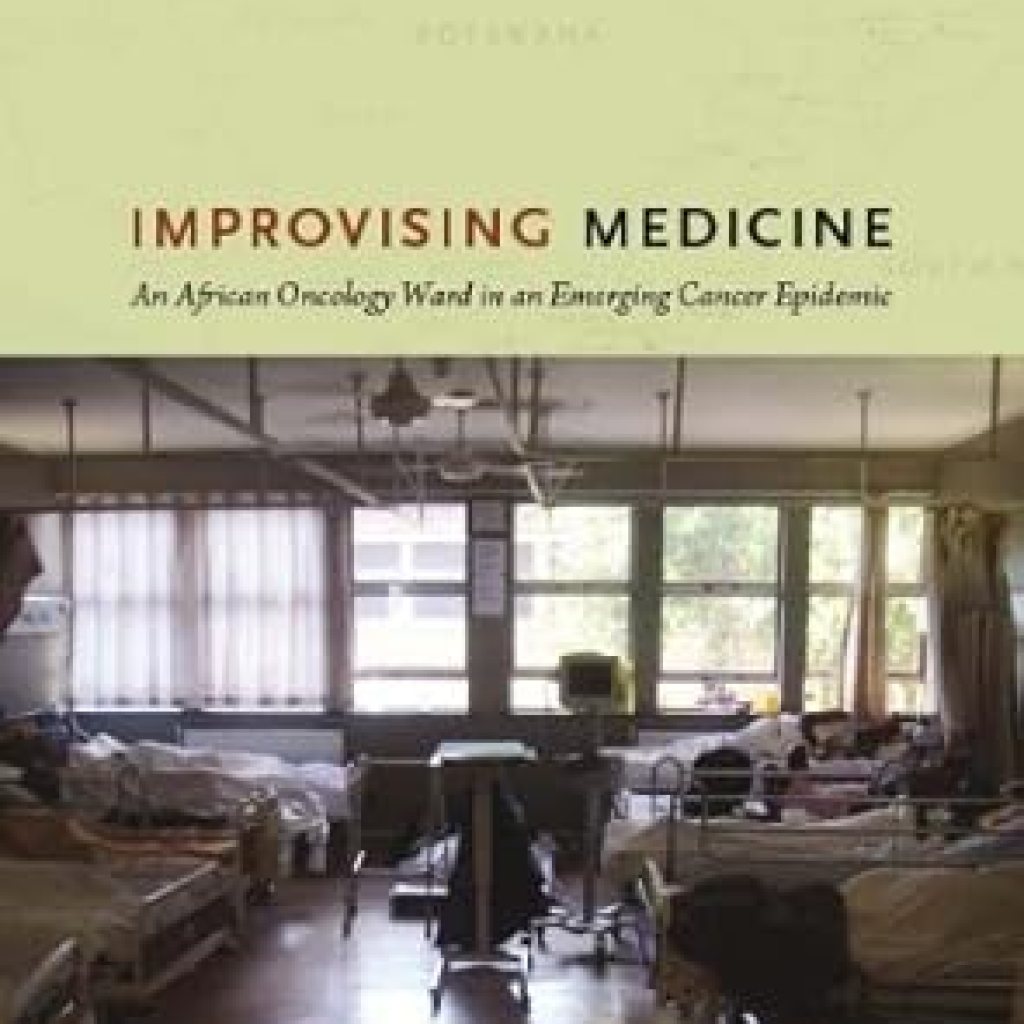Discover the poignant narrative of “Improvising Medicine: An African Oncology Ward in an Emerging Cancer Epidemic” by Julie Livingston, a compelling ethnography that takes you into the heart of Botswana’s only dedicated cancer ward in Gaborone. This insightful book offers a rare glimpse into the challenges faced by patients, families, and healthcare providers amidst a cancer epidemic that is reshaping health dynamics in the global south. With a focus on the human experiences intertwined with illness, Livingston masterfully illustrates how cancer is not just a medical condition but a deeply social phenomenon.
Through vivid storytelling, “Improvising Medicine” highlights the stark realities of healthcare in Africa, where resources are limited, and the fight against cancer is fraught with bureaucratic hurdles and emotional turmoil. This book is not only a necessary read for anyone interested in global health but also a heartfelt exploration of hope, resilience, and the complexities of care in a world where every day brings new challenges. Dive into this transformative narrative that underscores the importance of empathy and understanding in the face of adversity.
Improvising Medicine: An African Oncology Ward in an Emerging Cancer Epidemic
Why This Book Stands Out?
- Powerful Ethnography: Julie Livingston’s immersive storytelling captures the real-life experiences of patients, families, and healthcare workers in Botswana’s only dedicated cancer ward, offering a poignant look at the human side of illness.
- Global Relevance: The book addresses the rising cancer epidemic in the global south, making it a vital contribution to discussions about healthcare disparities and challenges faced in under-resourced settings.
- Complexities of Care: Livingston reveals the stark realities of high-tech medicine in a struggling healthcare system, highlighting issues like equipment failures and medication shortages that resonate with readers everywhere.
- Social Dimensions of Illness: The narrative emphasizes that cancer is not just a personal battle but a deeply social experience, illustrating how illness intertwines with community, culture, and care.
- Thought-Provoking Themes: The book explores profound themes of mortality, hope, and the political and economic factors that shape health outcomes, encouraging readers to reflect on the broader implications of healthcare.
- Insightful Reflection: Livingston provides a nuanced examination of the complexities of healthcare in Africa, making it compelling for anyone interested in global health, social justice, and the human condition.
Personal Experience
Reading Improvising Medicine: An African Oncology Ward in an Emerging Cancer Epidemic by Julie Livingston was a profoundly moving experience for me. It opened my eyes to the realities faced by patients and healthcare providers in Botswana’s only dedicated cancer ward. While I may not have personally experienced the challenges of cancer or the intricacies of healthcare in such a context, the stories woven throughout the book resonated deeply with my understanding of humanity and resilience.
As I turned each page, I found myself reflecting on the fragility of life and the interconnectedness of our experiences. The narratives captured in this ethnography made me think about how serious illness is never just a personal battle; it unfolds in the company of family, friends, and communities. Here are a few key insights that lingered with me:
- The Power of Community: The book illustrates how illness often draws people together, revealing the strength found in shared experiences and collective support during difficult times.
- Resilience in Adversity: Livingston’s portrayal of patients fighting cancer amidst broken machines and scarce resources reminded me of the incredible resilience of the human spirit when faced with adversity.
- Healthcare Gaps: It made me reflect on the disparities in healthcare access and quality between different parts of the world, and how much work remains to be done to ensure equitable care for all.
- Empathy and Understanding: The book encouraged me to approach discussions about illness and healthcare with more empathy, recognizing the complex social dynamics that surround these experiences.
- Hope Amidst Despair: Despite the challenges, the glimmers of hope that emerge in the narratives serve as a reminder of the importance of staying hopeful in the face of overwhelming odds.
Livingston’s ethnography is not just a story about cancer; it is an invitation to engage with the realities of those affected by it. It prompts readers like you and me to think beyond our own experiences and understand the broader social implications of health and illness. This book has stayed with me long after I finished reading it, and I believe it will do the same for you.
Who Should Read This Book?
If you’re curious about the complexities of healthcare in the global south, or if you have a passion for understanding how culture, society, and medicine intersect, then Improvising Medicine: An African Oncology Ward in an Emerging Cancer Epidemic is a must-read for you. This book speaks to a diverse audience, each of whom will find unique value in its pages:
- Healthcare Professionals: Whether you’re a doctor, nurse, or medical student, this book offers invaluable insights into the realities of practicing medicine in resource-limited settings. You’ll gain a deeper understanding of the challenges faced by healthcare workers and patients in Botswana’s oncology ward.
- Anthropologists and Sociologists: If you study human behavior and social structures, Livingston’s ethnography provides a rich narrative that illustrates how serious illness intertwines with the social fabric of life. Her observations shed light on the cultural dimensions of healthcare.
- Public Health Advocates: This book is perfect for anyone working in or studying global health. It highlights the emerging cancer epidemic in Botswana, offering a critical perspective on the broader implications for health policy and resource allocation in similar contexts.
- Students and Academics: If you’re pursuing studies in medicine, anthropology, or global health, this book serves as an engaging case study that will enrich your academic understanding and spark meaningful discussions.
- General Readers Interested in Social Justice: For those who are simply curious about the human condition and the politics of healthcare, Livingston’s storytelling brings to life the struggles and resilience of individuals navigating an often unjust system.
In a world where the narratives of marginalized communities are often overlooked, Improvising Medicine shines a spotlight on the human stories behind the statistics. It’s not just a book about cancer; it’s a profound exploration of hope, care, and the social dynamics of health. Don’t miss out on this powerful read!
Improvising Medicine: An African Oncology Ward in an Emerging Cancer Epidemic
Key Takeaways
Improvising Medicine offers profound insights into the complexities of healthcare in Botswana’s only dedicated cancer ward. Here are the key points that highlight why this book is an essential read:
- Human Experience of Illness: The book emphasizes that serious illness, such as cancer, is not just a medical condition but a deeply social experience that intertwines the lives of patients, families, and healthcare providers.
- Challenges of High-Tech Medicine: Readers will gain an understanding of the realities faced in resource-limited settings, where vital equipment is often broken, and essential medications may be unavailable.
- Social and Institutional Dynamics: Livingston explores the bureaucratic challenges and the interplay of power within the healthcare system, shedding light on how these factors shape patient experiences and outcomes.
- Global Health Context: The book situates Botswana’s cancer epidemic within the larger framework of increasing cancer rates across the global south, prompting readers to consider the implications for global health policy.
- Hope and Futility: Through poignant narratives, the author reflects on the social orchestration of hope amidst despair, illustrating the resilience of patients and healthcare workers in the face of overwhelming challenges.
- Palliative Care Insights: The exploration of palliation and the impact of disfigurement provides valuable lessons on compassion and the importance of holistic care in oncology.
Final Thoughts
“Improvising Medicine: An African Oncology Ward in an Emerging Cancer Epidemic” by Julie Livingston is not just a book; it is a profound exploration of the human experience within the context of a healthcare crisis. Set in Botswana’s only dedicated cancer ward, Livingston’s ethnography unveils the complex interplay of patients, families, and medical staff as they navigate the harsh realities of an emerging cancer epidemic. Through compelling narratives, the author illustrates how serious illness transcends the clinical, revealing the deeply social fabric of care, vulnerability, and hope.
This book offers valuable insights into the bureaucracy, power dynamics, and institutional challenges that shape healthcare in southern Africa. Livingston’s work emphasizes the importance of understanding cancer not merely as a medical condition but as a social experience intertwined with the lives of those affected. It is a timely reminder that the future of global health is intricately linked to the stories of individuals facing illness, pain, and mortality.
- Engaging narratives that highlight the human aspect of cancer care.
- Insights into the challenges of healthcare delivery in resource-limited settings.
- A critical examination of the politics and economics of health in Africa.
- Reflections on hope and futility in the face of serious illness.
If you’re looking for a book that combines deep empathy with critical analysis, “Improvising Medicine” is a worthwhile addition to your collection. Dive into this affecting journey that challenges our perceptions and fosters a greater understanding of global health issues. Don’t miss out on the opportunity to enrich your perspective—purchase your copy today!





